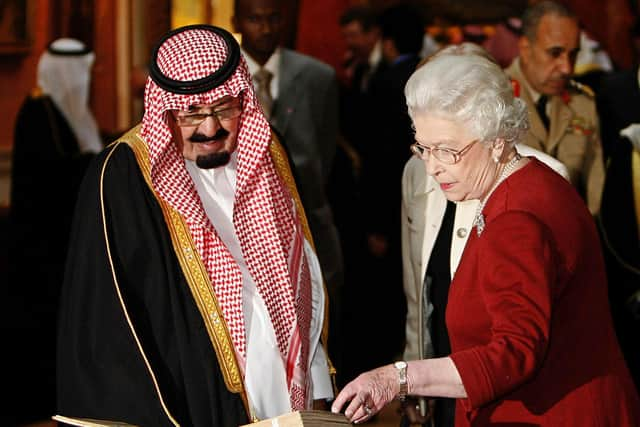Queen Elizabeth's credentials as a feminist are debatable but Queen Consort Camilla is a fully paid-up member of the sisterhood – Susan Dalgety
Even the Washington Post got in on the act, but like most of the articles, its author Karla Adam came to no firm conclusion.
Everyone agreed that even if the Queen had not read Germaine Greer’s The Female Eunuch or Mary Wollstonecraft’s A Vindication of the Rights of Women, she was a feminist, sort of.
Advertisement
Hide AdAdvertisement
Hide AdThey all cited similar sources to prove her adherence to the sisterhood, such as her opening remarks at the 2011 Commonwealth Summit, where the theme was Women: Agents of Change. “It reminds us,” she said, “of the potential in our societies that is yet to be fully unlocked and encourages us to allow girls and women to play their full part.”
Her 2013 decision to allow a change in royal succession law to give the daughters of future monarchs an equal right to the throne was lauded as an almost revolutionary act.
As was the now famous moment in 2003 at her beloved Balmoral, when she insisted on driving the then Crown Prince Abdullah of Saudi Arabia round the estate, at high speed. This at a time when Saudi women were not allowed to drive.
Was she making a stand for women? I like to think so, but does that make her a feminist? It’s debatable.
I tend to agree with Robert Hardman, author of Queen of Our Times. He told the Washington Post that he was not quite sure the Queen would have considered herself a feminist.


“She would probably be a feminist in the same sense as Margaret Thatcher was a feminist,” he added. “Feminists may not regard either [of them] as feminist figures, but they’ve undoubtedly helped reshape the way that society views women and women were empowered by their leadership roles.”
But even if the Queen did not burn her Rigby & Peller bra, or campaign for domestic abuse shelters and more women in parliament, she was, like many women of her generation, a female role model.
She enlisted in the war, like many of our grandmothers, keen to do her bit for King and Country. Through sheer necessity, she sometimes put her work responsibilities first, before the needs of her children. And in Princess Anne, she raised a daughter never afraid to speak her mind or pursue her own path in life.
Advertisement
Hide AdAdvertisement
Hide AdAnd for the 70 years of her reign, she stood, mostly silent it has to be said, as an enduring symbol of female power. Never let it be said that symbolism doesn’t matter.
My own granddaughters have only known women in charge, from the Queen to Theresa May, Nicola Sturgeon and now Liz Truss. They regarded Boris Johnson as nothing more than a silly man with funny hair. Nicola Sturgeon on the other hand, is the boss, not as smiley as the Queen was, nor as important, but definitely a woman to be reckoned with.
Sturgeon is an interesting case in point. Despite her recent protestations to the contrary, she has not been “feminist to her fingertips” throughout her career. Indeed, she is probably no more a feminist than Thatcher was, if a tad more progressive.
May, on the other hand, is a feminist. She co-founded Women2Win with Baroness Jenkin – whose grandmother was the only female Conservative MP elected in 1945. It’s aim is to increase the number of Tory women in Britain’s parliaments and in public life. And May is known for her mentorship of women candidates across the country, often giving up her weekends to campaign on their behalf, even when she was at the heart of power.
The Queen, of course, could not articulate her views on feminism, even if she was burning with rage about the patriarchy. Her role was to quietly counsel those with their hands directly on the levers of power, to use her immense knowledge of global affairs to gently steer people towards consensus, as she did on apartheid. And to scare the living daylights out of sexist sheikhs.
Those of us who are “gently” republican, a phrase I read recently and which resonates with me, look instead to our elected politicians for the legislative change required to secure equality of the sexes. And to our sisters for the relentless campaigning that brings about lasting cultural change – even in the face of stubborn male (and some female) resistance.
But if Queen Elizabeth II, born two years before all women were finally given the right to vote in 1928, was not a feminist, there may well have been a feminist queen hiding in plain sight for the last two decades.
The Queen Consort, Camilla, came of age with second wave feminism. Her independent, feisty character has seen the public, who once vilified her, warm to her instead.
Advertisement
Hide AdAdvertisement
Hide AdAnd she supports women’s causes such as the campaign to end domestic abuse and sexual assault. She has a fan in the self-confessed “hard-line” republican and women’s campaigner, Julie Bindel, who wrote recently that Camilla is most definitely a feminist.
“Camilla, for all her privilege, has decided that it’s the women with the most need and vulnerability who will be her priority. That, to me, is a true champion of women’s liberation,” she said.
At a time when the very definition of feminism is up for grabs, it is a relief to realise that while our dear, departed Queen was probably not a feminist, in the classic sense, our new Queen is most certainly a fully paid-up member of the sisterhood.
Comments
Want to join the conversation? Please or to comment on this article.
